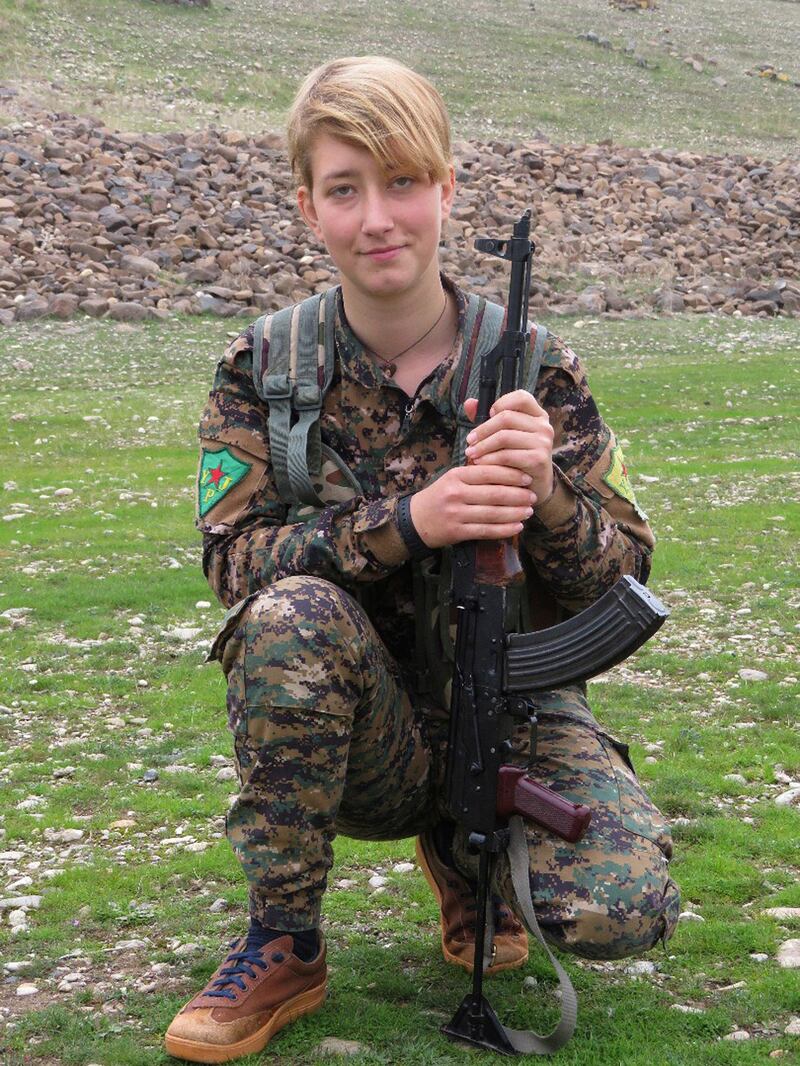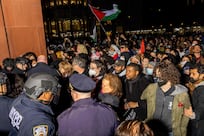The father of a young British woman killed on the battlefield in Syria six weeks ago has accused Britain’s Foreign Office of doing little to help retrieve her body to avoid fracturing the UK’s relationship with Turkey.
"They have said their remit is very limited and that they have little influence in the matter. Basically, they don't want to tread on the toes of anybody or affect Britain's relationship with Turkey," Dirk Campbell said in an interview with The Times published on Saturday.
Campbell, 26, died in an air strike during an offensive by Turkish forces against Syrian rebels on March 15. Although Turkish-backed forces secured the area within days they have not returned Campbell's body, which is believed to lie in the rubble of the house where she died. Mr Campbell said the family’s pleadings have been met with Foreign Office of “inertia”.
The UK Foreign Office said it advises against all travel to Syria and Britain is unable to provide any consular assistance there.
"It is extremely difficult to confirm the status and whereabouts of British nationals in Syria and anybody who travels to Syria against our advice is putting themselves at considerable risk, particularly if they travel to join an armed group. We urge strongly against any participation in this kind of activity," the Foreign Office said in response to questions from The National.
Ms Campbell, from East Sussex, joined an all-female Kurdish unit and reportedly died while travelling in a convoy struck by a Turkish missile.
She was one of an estimated 100 British people to join Kurdish forces fighting ISIS. She is believed to be the first British woman to have died in Syria while volunteering with the US-backed Kurdish Women’s Protection Units (YPJ) fighters, which has about 15,000 female fighters in its ranks.
Mr Campbell has asked for a meeting with UK Middle East Minister Alistair Burt to ask whether he is “happy” his daughter’s body is still in Syria. Mr Campbell also plans to raise questions about British weapons sold to Turkey for use against Kurdish fighters.
.@DNSARichard @BorisJohnson @theresa_may @AlistairBurtUK Calling on the UK government to negotiate a ceasefire so that my daughter's body can be retrieved along with the bodies of all who have been killed in Afrin since the Turkish offensive began #ceasefire4afrin
— Dirk Campbell (@dirkmcampbell) March 21, 2018
The Foreign and Commonwealth Office has not updated the family in a month, he said. Mr Campbell has been pressuring the UK through media interviews and Twitter posts to no avail.
“The FCO won’t have done anything specific … They’ve told me they can’t get involved in anything political. There’s huge inertia over the case,” Mr Campbell added.
The International Red Cross have said the area is dangerous and they cannot reach Campbell's body.
The former student at Sheffield University worked as a plumber in Bristol and became interested in the Kurdish cause. Campbell travelled to Syria in May 2017 to join the Kurdish fight and is thought to have spent her first few months fighting in Deir Ezzor.
When Turkey began a major offensive against the Kurds along the northern Syrian border in January, many Kurdish fighters moved to the Afrin front. British volunteers, including Campbell, are believed to have joined them.
"After the attack on Afrin, she insisted on being sent there," Nisrin Abdallah, a YPJ spokeswoman, told AFP.
_______________
Read more:
British woman killed fighting Turkish forces in Afrin
Father urges UK government to repatriate dead daughter's body from Syria
_______________
At the time of her death, Mr Campbell told the BBC: "She wanted to create a better world and she would do everything in her power to do that."
"I told her of course that she was putting her life in danger, which she knew full well she was doing. I feel I should have done more to persuade her to come back, but she was completely adamant."
According to Mr Campbell, his daughter’s Kurdish comrades tried to prevent her from going to Afrin.
"With fair hair and blue eyes they knew she would stand out, but she dyed her hair black and persuaded them to let her go," he said.
"I contacted my MP Maria Caulfield as soon as I knew she was in danger from the Turkish bombardment.
"I emailed my MP and said my daughter is in danger, you have to get on to the Foreign Office and get them to put pressure on Turkey to stop."
Campbell is the eighth British citizen to die while fighting for the group. YPJ commander and spokeswoman Nesrin Abdullah described Campbell's death as a "great loss".
In a statement she said: "Campbell's martyrdom is a great loss to us because with her international soul, her revolutionary spirit, which demonstrated the power of women, she expressed her will in all her actions.
"On behalf of the Women's Defence Units YPJ, we express our deepest condolences to [her] family and we promise to follow the path she took up. We will represent her in the entirety of our struggles."
Syria’s civil war has entered its eighth year, with heavy fighting around Afrin and in the rebel enclave of eastern Ghouta near Damascus.
Turkey and allied Syrian rebels began their assault on the Afrin region on January 20, seizing most of the canton before capturing its urban centre in March.
Up to 250,000 civilians were reported to have fled Afrin in March after Turkish-backed fighters took the surrounding region and all but encircled the city.






